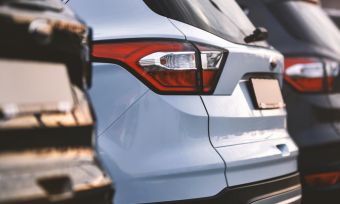Want to change the look of your car but don’t want to fork out for an expensive, irreversible paint job? Why not wrap your car in vinyl? What began as a way to add company liveries or advertising material to vehicles has become popular with regular motorists looking to give their rides custom paint jobs.
Car Wrapping in NZ: All You Need to Know: In this story we cover:
What is car wrapping?
Car wrapping is an innovative technique that involves sticking a thin, adhesive-backed vinyl sheet to the surface of a vehicle, covering its original paint job and thus transforming its look.
Not only is car wrapping a cheaper alternative to traditional spray-painting, it’s also far more versatile, as vinyl wraps come in far more colours, finishes and textures than regular paint.
Moreover, the application of vinyl wraps is a less time-consuming and more cost-effective process than traditional spray painting. While a full repaint can take several days or even weeks, a professional car wrapping job can often be completed in a fraction of the time.
The durability of vinyl wraps is another key factor contributing to their popularity. High-quality vinyl films are designed to withstand the rigours of everyday driving, protecting the underlying paint from road debris, stone chips and minor dings. Additionally, vinyl wraps offer a layer of defence against UV rays and harsh weather conditions, preventing paint fading and deterioration.
And, best of all, wrap jobs are easily reversible, leaving the resale value of the vehicle unaffected by even the most outlandish design/colour choice.
How much does wrapping a car cost?
The cost of a wrap depends on the chosen finish, vehicle size and complexity of the overall job. However, most vehicle wraps range from around $3000 t0 $6000.
When researching this story, we talked to a Tesla Model Y owner from Auckland. His metallic green wrap cost approximately $4000, and left him with enough vinyl in reserve to repair an additional three panels of his car, should the need arise.
Pros of Car Wrapping
Versatility: Car wraps come in a wide range of colours, finishes, and textures, providing endless customisation possibilities: gloss, satin, matt, metallic, chrome, brushed metal, extreme texture and special effects
Inside & out: Wraps can also be used inside of your car, for example to give your dash an expensive carbon-fibre finish.
Cost-effective: Generally, car wrapping is more affordable than a full paint job, making it a budget-friendly option.
Quick installation: A traditional paint respray can take several weeks to complete. Vinyl wraps, by contrast, usually take between two to five days.
Durability: High-quality vinyl wraps offer protection against road debris, stone chips, UV rays, and weather conditions, preserving the underlying paint.
Ease of maintenance: Cleaning is as simple as soap and water. For easier maintenance, a ceramic coating can be applied over the vinyl wrap.
Individuality: Stand out from the crowd with custom designs, patterns and textures.
Resale value: A well-maintained wrap can protect the car’s original paint, potentially preserving the resale value of the vehicle.
Removability: Paint is permanent, vinyl wrapping is not. Wrap is completely removable, easily reverting your vehicle back to its original paint work.
Compare Outstanding Value Car Insurance with Canstar
Looking for great value car insurance for you and your family? Each year, we release our car insurance awards, including winners for Insurer of the Year, Outstanding Value, and Most Satisfied Customers. As part of our award results, we also publish our Outstanding Value Star Ratings, covering car insurance for different age groups. Below are our top-rated providers in the drivers aged 30-49 category. Click here to view our complete car insurance Star Ratings for all age groups.
Comprehensive Cover: Drivers 30-49:
| Provider | Star Rating |
 |
|
 |
 |
 |
 |
See here for our ratings methodology. The table above is an abridged version of our research. For the full results of our latest Car Insurance Ratings and Award, click here.
Cons of Car Wrapping
Upfront cost: While generally more affordable than a full paint job, high-quality vinyl and professional installation can still incur a significant initial cost.
DIY challenges: Achieving a professional-looking result can be challenging for DIYers, and improper installation can lead to an unsatisfactory appearance.
Limited repair options: Unlike paint, damaged or scratched vinyl wraps may be more challenging to repair; often the entire vinyl panel needs replacement.
Not permanent: While some may see it as a pro, the fact that car wraps are not permanent may be a drawback for those seeking a long-lasting change in their vehicle’s appearance. Any damage to one small part of the vinyl wrap can also lead to quicker degradation of the entire area.
Quality variation: The quality of vinyl wraps can vary, and choosing a subpar product can result in premature fading, peeling, or other issues.
Damage to original paintwork: Wraps can affect aftermarket paintwork, plus removing a wrap can leave adhesive residue on a vehicle, requiring additional steps to restore a clean surface.
Heat sensitivity: Some vinyl wraps are sensitive to very high temperatures, potentially affecting their appearance and longevity in hotter climates.
About the author of this page
This report was written by Canstar’s Editor, Bruce Pitchers. Bruce has three decades’ experience as a journalist and has worked for major media companies in the UK and Australasia, including ACP, Bauer Media Group, Fairfax, Pacific Magazines, News Corp and TVNZ. Prior to Canstar, he worked as a freelancer, including for The Australian Financial Review, the NZ Financial Markets Authority, and for real estate companies on both sides of the Tasman.
Enjoy reading this article?
Sign up to receive more news like this straight to your inbox.
By subscribing you agree to the Canstar Privacy Policy









Share this article